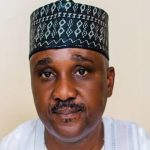...To get all news updates, Join our WhatsApp Group (Click Here)
Also Join our WhatsApp Channel (Click Here)
The Federal Government has traced at least N83 billion in cryptocurrency and fiat money channelled towards the recent nationwide protests, The PUNCH reports.
They include $50m of cryptocurrency — $38m of which were blocked in four cryptocurrency wallets — and N4bn contributed by various political actors in Abuja, Kano, Kaduna and Katsina.
This was part of a presentation by the National Security Adviser, Nuhu Ribadu, at the inaugural meeting of the Council of State convened by President Bola Tinubu at the Aso Rock Villa, Abuja.
According to multiple sources with knowledge of Tuesday’s meeting proceedings, Ribadu, who presented on the topic ‘The Nationwide Protest As It Affects National Security,’ also revealed that an European has been identified as the mastermind of the proliferation of foreign flags during the protests and will soon be declared wanted by the Police.
One of the sources, who spoke on condition of anonymity because he was not authorised to speak on the matter, disclosed that local conspirators traced to capital city Abuja, Kaduna and Kano have been arrested.
“In his presentation, the NSA said the government was able to trace $50m to crypto wallets that were made as donations to the protests. They succeeded in blocking four of those wallets containing $38m.
“They also found out that some political actors contributed N4bn to fund the protests,” one of the sources told The PUNCH.
The PUNCH had reported on Tuesday that President Tinubu convened the Council of State meeting to discuss, among other matters, the recent #EndBadGovernance protests, national security, the economy and food security.
The Council comprises the President (who serves as its chairman), the Vice President, all former Presidents and Heads of State, all former Chief Justices of Nigeria, the Senate President, the Speaker of the House of Representatives, the Attorney-General of the Federation, the Secretary to the Government of The Federation and all state governors.
Former Presidents Goodluck Jonathan and Muhamamdu Buhari attended the inaugural Council meeting, while former Heads of State, General Yakubu Gowon (retd.) and General Abdulsalami Abubakar (retd.), joined virtually alongside governors of Abia, Adamawa and Akwa Ibom State.
Obasanjo, IBB absent
However, former President Olusegun Obasanjo and former Head of State General Ibrahim Babangida (retd.) did not attend the meeting.
Tuesday’s gathering came days after Nigerians, mostly youths, hit the roads in Abuja for a one-million-man march. The march, which climaxed with a low turnout, marked the 10th day of the nationwide protest against the rising cost of living in the country.
On August 1, the opening day of the nationwide protest, demonstrations declined into destruction of property and loss of lives, especially in the North, leading to at least 17 reported deaths during the “days of rage.”
On August 3, just two days into the demonstrations, viral photos and videos showed demonstrators waving the flags in Kano State and chanting in Hausa, “We don’t want bad government.”
In Kaduna, a state in the north west, protesters were also seen waving the Russian flag and reciting in Hausa, “Welcome, Russia; Welcome, Russia.” Russia, an Eastern power which is currently mired in a proxy war with the West, has been blamed for several unconstitutional changes of government in West African countries such as Niger, Mali and Burkina Faso, among others.
The Nigerian military said the use of Russian flags during the protests was a treasonable offence, adding that it was investigating those behind the move and would “take serious action” against them.
While addressing the nation in a broadcast on August 4, President Tinubu warned demonstrators not to “let the enemies of democracy use you to promote an unconstitutional agenda that will set us back on our democratic journey.”
The PUNCH reported earlier that security agencies had identified at least four politicians from Katsina, Kaduna and Kano states, who, they said, promoted the use of the Russian flag among demonstrators with the intent to spark unconstitutional regime change.
Another source privy to the discussions at the Council of State meeting told our correspondent that these local actors have been arrested, with the foreign mastermind on the run.
The source said, “The NSA also briefed the Council that there was some element of foreign interference in the protest, that they found out that some foreigners fueled the protests. It was not just about Nigerians protesting against hardship.
“A foreign agent had been found to be connected to it and would soon be declared wanted by the Police. The police will make the announcement this week.
“This agent is a person of interest with his Nigerian collaborators; most of them have been arrested. They are looking for him. But his collaborators in Abuja, Kaduna, Kano and Katsina have been arrested. The NSA also confirmed that eight people died during the protests.”
Meanwhile, the Minister of Solid Minerals Development, Mr. Dele Alake, said no political actor would be allowed to instigate an unconstitutional regime change. He described the #EndBadGovernance protests as an attempt to achieve regime change, saying any such changes must be made through the ballots, not through insurrection.
“Any change of government has to be through the ballots and not through the barrel of the gun or insurrection or any other unconstitutional means,” Alake stated while briefing State House correspondents after the Council of State meeting at the Villa on Tuesday.
He added, “Matters of state were discussed in a robust and frank manner. The National Security Adviser was also on hand to present the security situation of the country. He informed the Council of State about the pre-, during and post-event of the last protests, which I do not call a protest. I call it a movement to effect a regime change by force, which was resisted.
“The Council thanked Nigerians at large for resisting any unconstitutional move to change the government. If anybody is not satisfied with the government, there is always an election coming, so you wait for the election and cast your vote.
“The NSA briefed the Council on the security situation and allayed fears. He spoke about the tightness of the security around the country and also reassured all and sundry that nobody would be allowed to truncate our hard-earned democracy. And he reassured us of the readiness of all security agencies in the country to secure our territorial integrity and protect Nigeria’s democracy.”
The cabinet member confirmed an earlier report by The PUNCH, stating that he and his counterparts from various ministries briefed the Council on seven areas: The Nationwide Protest as it Affects National Security; the State of the Economy; Food Security, Availability and Affordability; Milestones in the Solid Minerals Sector; Budgeting and Planning for Sustained Development; Milestones in the Road Sector and Leading a Strong Industrial Base for Transformation and Growth.
“Some of us ministers were invited to make presentations on our road map and what we’ve achieved, as well as the prospects and the challenges in our various ministries.
“And so, me, the Coordinating Minister of the Economy and the Finance minister, Mr Wale Edun, were there to make a presentation.
“The Minister of Budget was also there, he made his presentation. The Minister of Works also made a presentation and so did the Minister of Industry, Trade and Investment and the Minister of Agriculture,” he stated.
On his part, Finance minister Wale Edun told journalists that his data-based presentation at the Council meeting showed attendees Nigeria’s inflation rate, which he said was too high by Tinubu’s reckoning, was reducing steadily.
“In my case, we updated them on the economy, how much progress has been made in terms of the macroeconomic policies being followed under the leadership of President Bola Tinubu, and these policies are anchored on his eight priority areas and the results to date have been very encouraging.
“We looked at the data of this half year for which data was available, compared to the first and second quarters of 2023. And in broad terms, the economy is growing. The balance of payments, in particular, the trade and current account balances, are in surplus.
“The exchange rate is stabilising, and inflation, though uncomfortably high for the liking of Mr. President and his team, is slowing, and it is set to fall. But in particular, there has been support for the economy from investors, by way of portfolio investors and domestic investors, who are participating in important private-public partnerships, particularly the infrastructure sector and foreign direct investment, which is beginning to recover; I would say so.”
Edun noted that the takeaway from his presentation was that “we have exports, goods exports, non-oil exports, at $55bn last year with tremendous room to grow. And we reported an optimistic outlook for the Nigerian economy and society in general due to prospects for economic growth and progress.”
He said the service sector, particularly the outsourcing industry, was highlighted as a sector with high prospects for growth in the near future.
The Chairman of the Nigeria Governors’ Forum, Governor AbdulRahman AbdulRazaq, announced that the Council of State unanimously passed a vote of confidence on President Tinubu.
“The high note of the meeting was a unanimous passage of a vote of confidence on President Bola Tinubu, GCFR, Commander in Chief of the Nigerian Armed Forces,” AbdulRazaq, the Governor of Kwara State, said.
“Members, especially those of the Nigerian Governors’ Forum, were satisfied with the presentation by the members of the Federal Executive Council, and after that meeting, there was an executive session between members of the NGF and Mr President, and frank and fruitful discussions were held between both parties.
“I’m glad to say we are on the right track. And to say in the same vein, members of the NGF, like the members of the Council of State, also passed a vote of confidence on Mr. President.”
The Council was last held 18 months ago – February 10, 2023 – under former President Muhammadu Buhari. At the time, Buhari had convened the meeting to discuss the 2023 elections, the crisis emanating from the new naira policy and fuel scarcity.
The National Council of State is a constitutional organ of the Nigerian government that advises the executive on policy-making, among other functions. Its largely advisory role is to guide the President in decision-making processes on national security, appointments and economic policies.
At the President’s behest, the Council meets to deliberate on crucial national issues, including—but not limited to—national security, economic challenges and the appointment of key public officials like the chairman and members of the Independent National Electoral Commission, the National Population Commission and the Police Service Commission.
Additionally, the Council advises on the exercise of the President’s powers regarding pardons and commutations. The meetings are typically convened by the President and are not held regularly but are instead called as needed, especially when the country faces significant challenges that require input from past and present leaders. Though not binding, the Council’s recommendations often influence presidential decisions.
You can get every of our news as soon as they drop on WhatsApp ...To get all news updates, Join our WhatsApp Group (Click Here)
Also Join our WhatsApp Channel (Click Here)

















